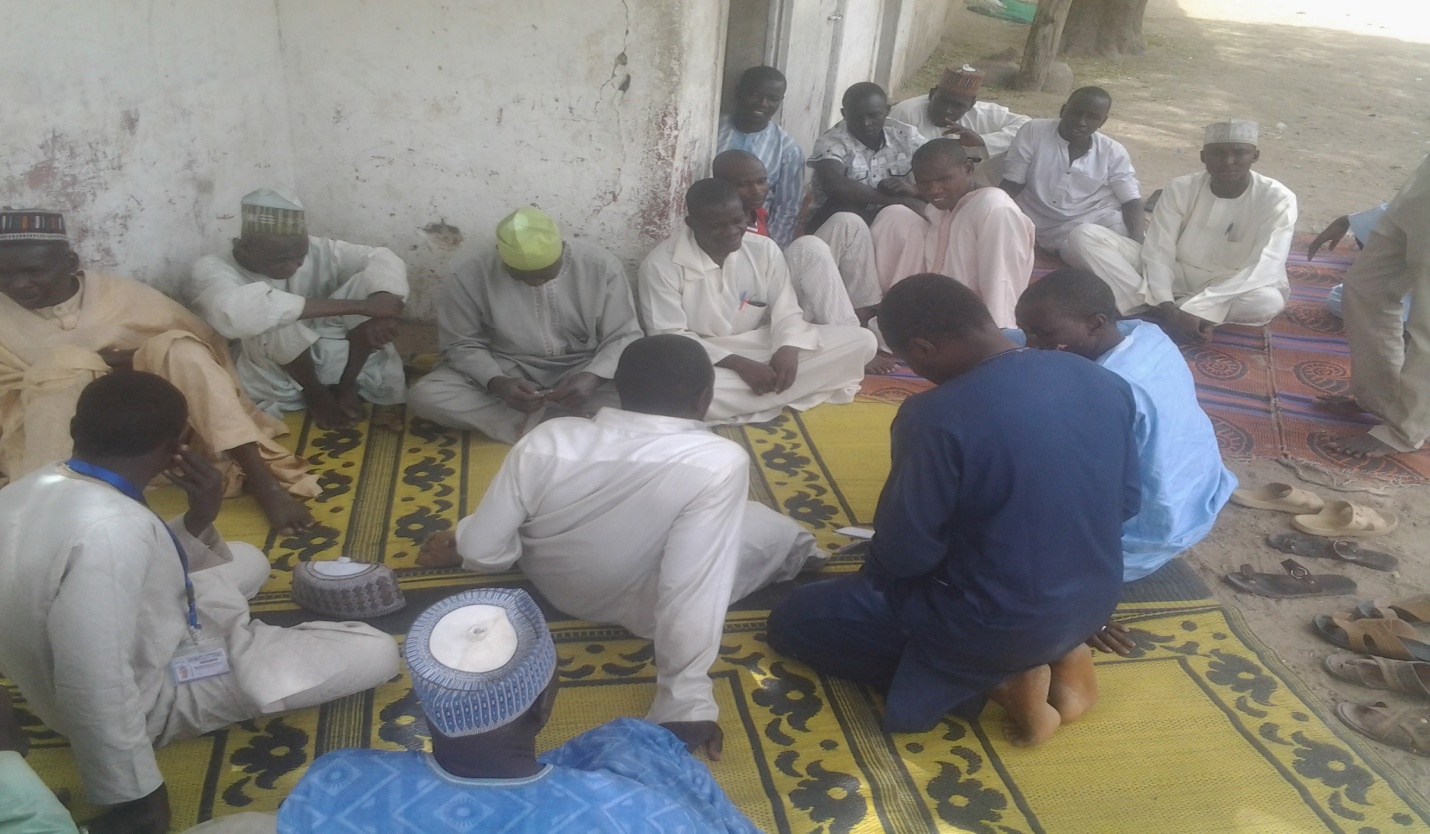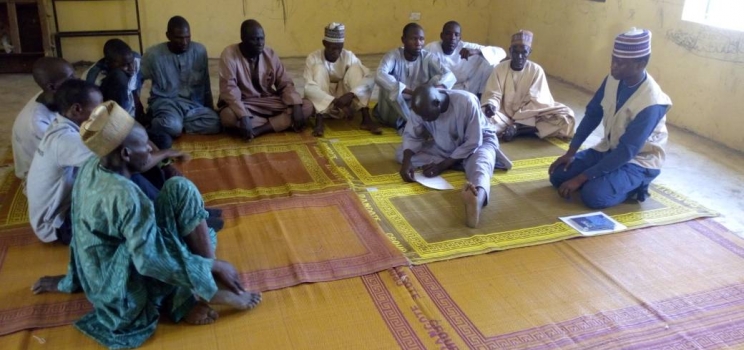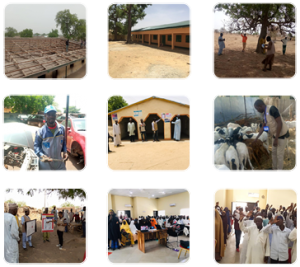…..With Non-State Armed Group in Retreat, Communities embraces Early Warning Initiative, collaborate to prevent violence
Our social relationship has really improved as a result of the Early Warning/Early Response intervention in this community

a group of participants brainstorming during a training session for CRN members on Strengthening Early Warning Mechanism in Borno. Picture: CCDRN
Custom IDP camp is one of the communities in Mafa local government area of Borno state, Northeast Nigeria, where Search For Common Ground (SFCG), in partnership with Centre for Community Development and Research Network, (CCDRN), is implementing a components of it Early warning and early response project to expand and strengthen the process to enhance community and state actors’ ability to protect citizens
Displaced by Boko Haram insurgency, which ravaged most parts of Borno state and environs, custom IDP camp houses families forced to flee their various communities and villages to seek refuge and avoid being caught up in the quandary. Considering the complex nature of the people brought together by common fate to live as one community at the custom IDP camp, their language differences and barrier with some from Shuwa, Fulani and Kanuri, ways of life, religion and culture, the reality of conflict is definite.
Prior to Search For Common Grounds Intervention in strengthening early warning and response process in the community, Social relationship among community members at the custom house IDP camp and other communities affected by Boko Haram insurgency was extremely strained with recorded cases of misunderstandings and sundry conflicts that were not handled in a coordinated manner. Engagements and Joint effort between communities, local government officials and security actors to respond to early warning signs of violence was minimal due to stumpy capacity and limited skills in reporting and responding to early warning signs of conflict. Most cases of violence and other conflicts where taken to the police and other security agents within the camp and are handled with little or no recourse to the camps community leadership structure.
This situation left community members more divided, estranged and vulnerable to violent conflict than ever before. Lack of mutual trust among community members, fear and reciprocal suspicion between communities and security agencies further compounds the dilemma. Custom IDP camp in Mafa local government area of Borno state is home to Jugudum Abba Umar, the commander of Civilian Joint Task Force, CJTF, in the Camp community and a beneficiary of SFCGs capacity building training on strengthening Early Warning Response.
Against this backdrop, when Search For Common Ground in partnership with Centre for Community Development and Research Network launched its intervention in Mafa, Jere, Maiduguri Metropolitan Council and Monguno local government areas, an advocacy visit was organised and the idea of enhanced joint effort between communities, security agencies and state actors in responding to security concerns was promoted and bought by the communities
Consequently, CCDRN took a step and established effective mechanisms for identification of Early Warning Signs in the communities by deploying reliable and committed persons from within the existing community structures in all four local governments to serve as Community Observers. The Community Observers were trained and armed with the requisite skills and technology to identify Early Warning Signs and report promptly to the appropriate body. CCDRN also supported existing community structures and formed a network that manages Early Warning Signs in the community. One Community Response Network was formed per community across the four local government areas. The Community Response Networks members were trained and tasked on receiving Early Warning Response Signs alerts from the Community Observers and to take appropriate actions on them. To equip beneficiaries with requisite skills, Search For Common Ground in partnership with CCDRN organised two different trainings to enable Community Response Networks to perform their responsibilities effectively.
Jugudum Abba Umar was one of the beneficiary from custom IDP camp in Mafa local government area who participated in the training organised for Community Response Network members across the four focal local government areas of Jere,Mafa, Monguno and Maiduguri Metropolitan Council. Participants acquired hands-on skill in Concept of EW identification and response; Quality control of EW information; Use of appropriate communication mechanisms/platforms for EW response; EWR analysis frameworks; Identification and assessment of EWR options; Trauma awareness and sensitivity; Confidentiality mechanism in identifying and reporting EWS and Local resource mobilization
When Jagudum came back to his community at the Custom IDP camp with acquired skills from the training alongside other CRN members from the community, he deployed his acquired skills to use, trained other community members and helped to facilitate peaceful resolution of conflicts, working in consonance with other stakeholders to further deepen community based sustainability strategy for handling Early Warning Signs in his community. When CCDRN team visited custom IDP camp, Jagudum could not hold back his appreciation.
“I am the chairman Cilivilian Joint Task Force (CJTF) of Custom House IDP camp, one of the happiest person to have benefit from what search brought to us. Our social relationship has really improved as a result of the Early Warning/Early Response intervention in this community. In the past, we use to have at least 4-5 cases of misunderstanding in every 6 month, but now hardly we have 2 cases”.
“More so, in the past we use to take our cases to Police station and court, but now having been sensitized by SFCG, we now select elders, traditional and religious leaders to shoulder the responsibility of managing our cases/grievance at the community level. In fact, about two years ago, I and my neighbour quarrelled over children, but the members of CRN facilitated reconciliation between us, and now we live peacefully. And as a result of that I am been the one preaching for peace and reconciliation in this community Now even cases between husbands and wives are settled at the community level by our religious leaders”. He said
Corroborating Jagudum’s position, Baba gana Mustapha, a community observer at the custom house IDP camp also testified to the improved relationship in his community as a result of the intervention by Search.
“Our communal relationship has really improved compared to the past before our engagement with SFCG. Here, we are people from different backgrounds like suwa, Fulani, kanuri, etc. and language differences has been a major source of conflict and misunderstanding. After Search came with its intervention on strengthening early warning and response to our community, we now try to speak a language that is understood by all because we now see ourselves as one”. He said.
This development was not different even at Lamisula/jabamari community of Jere local government area, where the Village Head, Bulama Shettima, who represented the Ward head, Lawani Shetima Jibrin, noted how Search For Common Grounds intervention helped to improve the security condition of the community.
“I am Bulama Shatima. I am representing Lawani Shatima Jibrin. We were living in bad condition security and social wise until the coming of SFCG. The regular monthly meetings of SFCG keeps educating us, as a result we now understand that we have power to demand our rights from the government. Additionally, we were empowered with knowledge and skills to manage our cases at the community level. In fact, more than 75% of our cases are being settled at the community level. But if they are beyond our power, SFCG helps to channel them to the appropriate government authorities like the Police and Local Government Authority when the need arises. Security issues have not come up for about 6 month now. Moreover, the cases of theft have not occurred for about 3 month now. In essence issues of security and theft are being well addressed by the security agents as a result of our engagement with SFCG”.
Worthy of note is the effort of the Community Response Network meetings which has been singled out as a major aspect of the project which help to strengthen relationship between different groups and organizations in the communities and serves as a veritable platform in tackling security concerns and varied issues in the community. Citing examples to buttress this point, Dauda Bulama Yusuf, the community head of Bolori 1 in Maiduguri Metropolitan Council, gave CCDRN team a blow by blow detail of how the Community Response Networks meetings has helped his community in handling conflicts.
“I am the Bulama of this area. The CRN meetings now help us to filter issues in the community and proffer solution with immediate effects. The case of man who was engaged in defiling girls that was confronted by the community is clear evidence. Instead of going to the police, we set up a panel to invite him and cautioned him against the act and he promised not to indulge in any such act in the future. Another example is the case of KEKE NAPEP riders who used to disturb the community with their music in their tricycle, following complains by community members; we stepped in and handled the matter amicably to the satisfaction of all parties without police involvement. In addition to understanding the importance of managing cases at the community level, SFCG helped us to know the channels and modalities to manage our cases in at the community level. Moreover, in a case where by issue is beyond our power, SFCG support us in channelling the issue to the appropriate government institution and we are very grateful for this intervention”, says Dauda.

community members happily deliberating during a monthly CRN meeting
Prompt and effective conflict resolution is one area of improvement Adamu A. Aliyu, a community member in Jere Local Government saw as a high point following SFCG’s intervention. Adamu Aliyu says this of his experience.. “Praise is to God, we have seen a lot of development as a result of Early Warning/Early Response in this community. There was a boy who wanted to use his inherited land for sport viewing centre in this community. The members of community became divided over the issue. In this case, some were in the support while others were against. Two of our elders in this community, one belonging to the support group, the other one belong to the opposition bloc. The unfriendly relationship between these two of our elders became a major issue of concern to this community member, especially the youth. But thank God, the issue was presented during our CRN meeting and Mubarak (SFCG M&E coordinator) took the matter upon himself and facilitated a reconciliation process between the two elders. As am talking to you now the two elders now live in harmony as a result of Mubarak’s involvement from SFCG”.
Evidential attestations also points toward efforts by communities reached by the SFCG’s strengthening early warning/Early Response system to own the process of engendering peace among themselves and ensuring its sustainability beyond the lifespan of the intervention. In Malakyalari community of Mafa Local Government Area, moves to expand and deepen the process have led to creation of sub groups and organisations to serve as auxiliary bodies.
“My name is Muhammed Ibrahim. I am the Joint Task Force chairman of Malekyaleri community. As a result of the intervention of Search For Common Ground in this community, a youth development association called MAYDA (Malekyaleri Youth Development Association) was formed. This association pays attention to issues of security, drainage system and cases of rape in the community. More so, Due to the intervention of the SFCG in this community, cases like conflict between husbands and wives and interrelationship between and among people are now settled at the community level mostly by CRN members and we now understand that it is our community and hence our responsibility to ensure peaceful coexistence. We intend to continue doing this even without SFCG. This was how it was with our fore fathers before civilisation and other factors disrupted the process” Muhammed told CCDRN team
In the same vein, Bulama Bajim, the community head of Bolori added that, “The intervention of Search For Common Ground has enabled us to establish an intercommunity development association called KASIZA, which is an acronym of Kaleri,Sinnari and Zannari Association. This association helps in the area of sanitization, clearing of drainage systems and education of children in the 3 communities”
Evidently, working under the premise that using local knowledge and local communities is crucial for early warning and response to be successful at the community level, Search For Common Ground and its implementing partners, the Centre for Community Development and Research Network has worked to firm up community based early warning signs and early response system by increasing capacity of communities in Jere, Mafa, Monguno and Maiduguri Metroplitan Council. Testimonies points towards increased partnership between communities, local authorities and state actors to respond to early warning signs of violence. Engagements have also been reinforced between state and local actors to secure communities.
With Bako Haram in retreat, communities are beginning to understand the benefits of owning the process of ensuring peaceful coexistence and shared bond as the only way to forestall violence and keep radical extremism at bay. There is concerted effort by stakeholders across board to restore peace and ensure resilience in once fragile communities.

